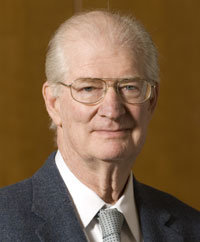Quite a remarkable lecture on the possibilities and limitations in truly greening our economics.
Continue reading Tim Jackson: Prosperity Without GrowthEconomic Growth
From The Daly News blog
 by Herman Daly
by Herman Daly
There may well be a be a better name than “steady-state economy”, (SSE) but both the classical economists (especially John Stuart Mill) and the past few decades of discussion, not to mention CASSE’s good work, have given considerable currency to “steady-state economy” both as concept and name. Also both the name and concept of a “steady state” are independently familiar to demographers, population biologists, and physicists. The classical economists used the term “stationary state” but meant by it exactly what we mean by steady-state economy-briefly, a constant population and stock of physical wealth. We have added the condition that these stocks should be maintained constant by a low rate entropic throughput, one that is well within the regenerative and assimilative capacities of the ecosystem. Any new name for this idea should be sufficiently better to compensate for losing the advantages of historical continuity and interdisciplinary familiarity. Also, SSE conveys the recognition of biophysical constraints and the intention to live within them economically-which is exactly why it can’t help evoking some initial negative reaction in a growth-dominated world. There is an honesty and forthright clarity about the term “steady-state economy” that should not be sacrificed to the short-term political appeal of vagueness.
Continue reading Herman Daly: Fitting the Name to the NamedJohn Fullerton of the Capital Institute, and formerly an executive of JP Morgan Chase, calls for a holistic, ecological approach toward a new economy. Sounds like he should think about the political alternatives that agree.
Continue reading When Growth Bumps Into the BiosphereFrom the Post Carbon Institute
Posted Oct 1, 2010 by Richard Heinberg
This is the second part of a two-part post from a new book-in-progress with the working title ‘The End of Growth’. Only some of the book’s contents will be serialized this way. The final product, with graphs and footnotes, will be published by New Society Publishers in September 2011. Read Part 1 here. Read more ‘End of Growth’ excerpts.
Business Cycles, Interest Rates, and Central Banks
We have just reviewed a minimalist history of human economies and the economic theories that have come into vogue to explain and manage them. But there is a lot of detail to be filled in if we are to understand what’s happening in the world economy today. And much of that detail has to do with the spectacular growth of debt-in obvious and subtle forms-that has occurred during the past few decades. That phenomenon in turn must be seen in light of the business cycles that characterize economic activity in modern industrial societies, and the central banks that have been set up to manage them.

This article is an excerpt from Richard Heinberg’s new book which has the working title ‘The End of Growth’ and is set for publication by New Society Publishers in July 2011. Given the urgency and fragility of the global economic crisis, the Post Carbon Institute is serializing the rough content as Richard writes it. Additionally, Richard will be offering ‘live peeks’ at the events and information that inform his writing process through Facebook and Twitter accounts created expressly for this publication.
The article was originally published as the MuseLetter #222
Introduction: The New Normal
The central assertion of this book is both simple and startling: Economic growth as we have known it is over and done with.
The “growth” we are talking about consists of the expansion of the overall size of the economy (with more people being served and more money changing hands) and of the quantities of energy and material goods flowing through it.

The economic crisis that began in 2007-2008 was both foreseeable and inevitable, and it marks a permanent, fundamental break from past decades-a period during which most economists adopted the unrealistic view that perpetual economic growth is necessary and also possible to achieve. There are now fundamental barriers to ongoing economic expansion, and the world is colliding with those barriers.
Continue reading Intro: The End of Growth